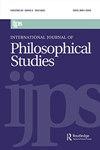与专家意见相左
IF 0.6
3区 哲学
0 PHILOSOPHY
INTERNATIONAL JOURNAL OF PHILOSOPHICAL STUDIES
Pub Date : 2023-05-27
DOI:10.1080/09672559.2023.2263712
引用次数: 0
摘要
摘要本文探讨了在公共审议的背景下,谁应该被信任为专家以及何时被信任的问题。在公共政策决策中,对专家的信任至关重要,因为公共政策涉及的复杂信息超出了大多数人的专业知识范围。然而,富有成效的审议还需要能够抵制错误信息运动,无论这些运动有多普遍;一般来说,能够评估我们掌握的证据并形成我们自己的观点。本文的目的是反思这种认知服从和认知独立之间明显的紧张关系。本文有两个目标。首先,它旨在通过审查专家在公共场合提出看似事实的主张的案例,对谁应该被信任作为专家的问题提供更细致入微的理解。其次,它强调需要关注我们真正相互信任的条件。我们建议,培养对科学的信任可能更好的方法是修改进行科学对话的条件,而不是试图说服公众信任专家,或者指责他们没有这样做。关键词:信任不信任专家分歧科学传播致谢感谢Manuel de Pinedo对本文前一版本的评论。我们也感谢研讨会的参与者(No)更多的故事:科学传播的新挑战,由Ophelia Deroy领导,由慕尼黑大学高级研究中心“科学传播的挑战和规范”研究小组组织。披露声明作者未报告潜在的利益冲突。参见Kappel (Citation2020)最近的一个讨论,从认识论上讲,当我们知道别人不信任我们信任的人时,我们应该怎么做。最近的文献不仅开始探讨专家的特征,而且还探讨了非专家的异质性以及这种异质性如何影响科学传播的背景(见Pérez-González和jimsamunez - buedo Citation2023)。这些策略的有效性是有限的。研究表明,与他人的偏见相比,我们往往会低估自己的偏见,这被称为“偏见盲点”,它会阻碍我们识别自己偏见的能力。此外,一些学者最近认为,在任何情况下,内省都不能可靠地检测我们的偏见(例如,参见Kelly Citation2023)。本研究的发表得到了欧盟地平线2020研究与创新计划的资助,资助协议编号870883。这项工作也得到了西班牙大学和下一代欧盟部、西班牙科学部[PID2019-109764RB-I00, PID2022-140562NB-I00]、Junta de Andalucía [b - humi -459- ugr18]、BBVA基金会[BBVA2021-EQUIPOS, AYUDAS FUNDACION BBVA2021,项目:OPIDPOLA]和格拉纳达大学资助的FiloLab卓越小组的部分资助。本文章由计算机程序翻译,如有差异,请以英文原文为准。
Disagreeing with Experts
ABSTRACTThis paper addresses the question of who should be trusted as an expert and when, particularly in the context of public deliberation. Trust in experts is crucial in making decisions about public policies that involve complex information beyond the expertise of most people. However, fruitful deliberation also requires being able to resist misinformation campaigns, no matter how widespread these might be; being able, in general, to evaluate the evidence at our disposal and form our own opinions. The purpose of this paper is to reflect on this apparent tension between epistemic deference and epistemic independence. The paper has two goals. First, it aims at providing a more nuanced understanding of the question of who should be trusted as an expert by examining cases in which seemingly factual claims are made in public settings by experts. Second, it emphasizes the need to pay attention to the conditions under which we actually trust each other. We suggest that fostering trust in science may be better approached by modifying the conditions under which scientific dialogue takes place, rather than trying to convince the public to trust experts, or blaming them for not doing so.KEYWORDS: Trustdistrustexpertsdisagreementscience communication AcknowledgmentsWe thank Manuel de Pinedo for his comments on a previous version of this article. We also thank the participants of the workshop (No) more stories: The new challenges of science communication, led by Ophelia Deroy, and organized by the Center of Advanced Studies’ Research Group Challenges and norms of science communication (University of Munich).Disclosure StatementNo potential conflict of interest was reported by the author(s).Notes1. See Kappel (Citation2020) for a recent discussion of what we should do, epistemically speaking, when we learn that others don’t trust the ones we do trust.2. Recent literature has started to explore not only the characteristics of experts, but also the heterogeneity of non-experts and how this heterogeneity impacts the context of science communication (see Pérez-González and Jiménez-Buedo Citation2023).3. The effectiveness of these strategies is limited. Research has shown that we tend to underestimate our own biases compared to those of others, known as the ‘bias blind spot’, which can hinder our ability to recognize our own biases. Additionally, some scholars have recently argued that there is no circumstance under which introspection can be reliable to detect our biases (see, for instance, Kelly Citation2023).Additional informationFundingThe publication of this work was made possible with funding from the European Union’s Horizon 2020 research and innovation programme under grant agreement No 870883. This work was also partially funded by the Spanish Ministry of Universities and Next-Generation EU, the Spanish Ministry of Science [PID2019-109764RB-I00, PID2022-140562NB-I00], Junta de Andalucía [B-HUM-459-UGR18], the BBVA Foundation [BBVA2021-EQUIPOS, AYUDAS FUNDACION BBVA 2021, project: OPIDPOLA], and the FiloLab Group of Excellence funded by the University of Granada.
求助全文
通过发布文献求助,成功后即可免费获取论文全文。
去求助
来源期刊

INTERNATIONAL JOURNAL OF PHILOSOPHICAL STUDIES
PHILOSOPHY-
CiteScore
0.90
自引率
0.00%
发文量
29
期刊介绍:
The International Journal of Philosophical Studies (IJPS) publishes academic articles of the highest quality from both analytic and continental traditions and provides a forum for publishing on a broader range of issues than is currently available in philosophical journals. IJPS also publishes annual special issues devoted to key thematic areas or to critical engagements with contemporary philosophers of note. Through its Discussion section, it provides a lively forum for exchange of ideas and encourages dialogue and mutual comprehension across all philosophical traditions. The journal also contains an extensive book review section, including occasional book symposia. It also provides Critical Notices which review major books or themes in depth.
 求助内容:
求助内容: 应助结果提醒方式:
应助结果提醒方式:


